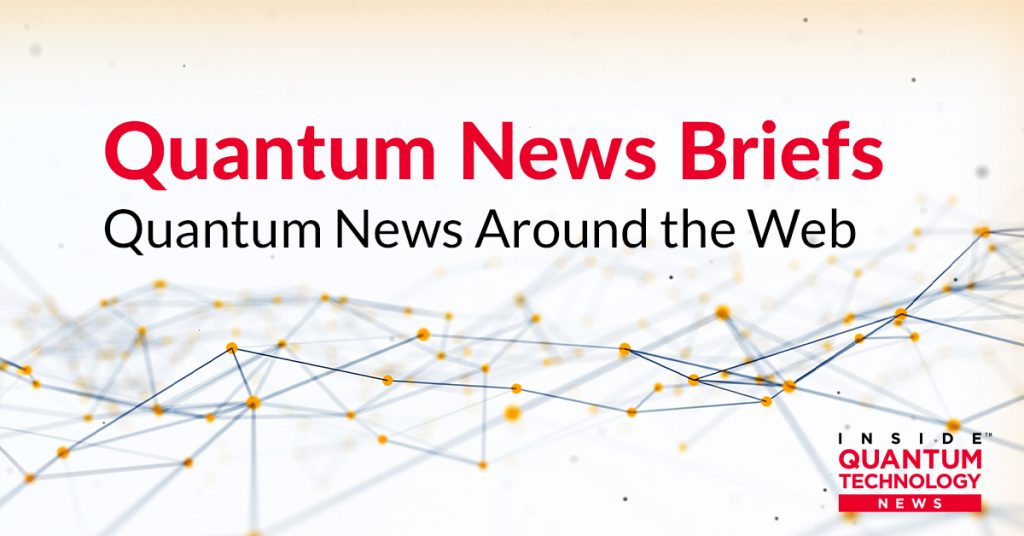Quantum News Briefs September 22: opens with news that the Novo Nordisk Foundation has awarded grant of US $200 million to develop the first quantum computer dedicated to life sciences research and the green transition; ColdQuanta wins “Best of Sensors 2022” for Maxwell, a Quantum RF Sensor Platform; & SK Telecom leads demonstration of quantum-based gas sensing system at LNG terminal and MORE.
Novo Nordisk Foundation awards grant of US $200 million to develop the first quantum computer dedicated to life sciences research and the green transition
The ambitious Novo Nordisk Foundation Quantum Computing Programme launched in collaboration with the University of Copenhagen includes world-leading researchers in quantum computing from Denmark, Canada, The Netherlands and the USA.
By applying next-generation quantum computing to the life sciences, the Novo Nordisk Foundation and its partners have the ambition to deliver revolutionary and applicable new insights which will transform the understanding of crucial scientific problems that pose a huge unmet medical and environmental need. Quantum technologies will be key in the advent of personalised medicine by allowing the analysis of immense genomic data sets, as well as adding clarity to the complex interactions of the human microbiome, or by accelerating drug discovery and development of new medicines. The ambition is that a quantum computer will also be a fundamental tool in designing new sustainable materials, delivering new energy-saving solutions or assisting with new approaches to decarbonisation.
We want to create an international powerhouse in quantum research, a field with tremendous potential. We want to create, mature and develop technology that can solve major and current challenges within health, sustainability and other areas,” says Mads Krogsgaard Thomsen, CEO of the Novo Nordisk Foundation. Click here for complete announcement.
*****
ColdQuanta wins “Best of Sensors 2022” for Maxwell, a Quantum RF Sensor Platform
ColdQuanta’s Maxwell, a Quantum RF Sensor Platform, is an advanced RF sensor based on quantum technology. The Maxwell’s quantum technology uses atoms to differentiate between incident RF fields. It has a fixed form factor that is independent of the RF frequency or wavelength being measured.
“Quantum RF sensors hold many advantages over classic antenna-based receivers, and are a transformational technology for military communications, radar, and electronic warfare,” said Chester Kennedy, president of research and security solutions at ColdQuanta. “In addition, these sensors offer the potential to transform commercial communications through significant increases in spectrum availability with improved performance characteristics across the entire range.
*****
SK Telecom leads demonstration of quantum-based gas sensing system at LNG terminal
SK Telecom (SKT) said it has signed a memorandum of understanding with Boryeong LNG Terminal and Quantum Sensing, a domestic optical instrument manufacturer, to install a gas sensing system next year at an LNG storage tank located in Boryeong, some 130 kilometers (80 miles) southwest of Seoul. SKT will supply key components and lead the localization of equipment through collaboration with Quantum Sensing.
“By applying quantum technology to the domestic gas safety field, we will present a new paradigm for gas safety,” SKT’s chief development officer Ha Min-yong said in a statement on September 20. “We will expand the application to gas production bases and various sites at risk of gas leakage, and expand it to environmental fields that detect various environmental gas leaks.”
*****
QCI Launches Subscription Service for Its Dirac 1 Entropy Quantum Computer
QCI will offer subscriptions to the EQC at various levels; from several hours per month to a fully dedicated system, depending upon customer requirements. Pricing will be competitive with subscription levels offered by others in the marketplace, but with significantly more availability and computational capability.
Dirac 1, which focuses on solving binary optimization problems, is only the first system that QCI will be making commercially available. In Q4, the Company plans to launch Dirac 2, which will enable customers to run much larger integer-number optimization problems.
For more information on the Dirac 1 EQC subscription service, visit this page on the QCI website.
*****
Sandra K. Helsel, Ph.D. has been researching and reporting on frontier technologies since 1990. She has her Ph.D. from the University of Arizona.
